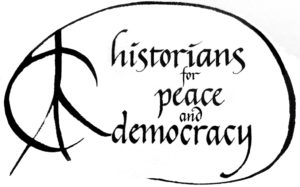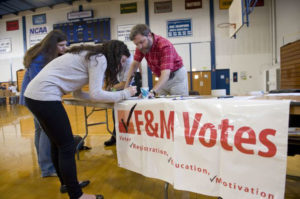
H-PAD Update
Newsletter #3, June 14, 2020
CRISIS: Fighting racist policing and governmental mismanagement of the COVID-19 pandemic
(also available as a pdf for downloading and/or printing)
What Can Historians Do in the Current Crisis?
On June 4, the Steering Committee of H-PAD issued “A Statement of the Historians for Peace and Democracy (H-PAD) on the Current Struggle” (https://new.historiansforpeace.org/). To begin to implement this statement we are offering the following suggestions on how historians, historically oriented activists, and progressive intellectuals can use our particular skills to intervene politically in this crisis. We plan to follow up with additional newsletters that offer further suggestions for actions, report-backs on actions taken by our members and supporters, and direct attention to work being done by allied forces. We are trying to assemble a task force within H-PAD to take responsibility for this ongoing work—more on this below.
However, for now, here are:
7 Suggestions from Historians for Peace and Democracy
As the United States and the world confront interlocking crises (state violence, racism and anti-Blackness, the pandemic, neoliberal austerity, etc., etc.), how can we as historians be most effective? Here are some ideas for taking action, both individually and collectively.
- Volunteer for our media interview list. Want to be on a list of experts that we circulate to media outlets? Send us your name, areas of expertise, a short bio, and a link to your faculty page if applicable. Email skotna@sage.edu.
- Volunteer to speak as a historical expert at a city council meeting where budgets or police are being discussed. Ideally, coordinate your efforts with a local POC-led organization. When working with organizations, strive to follow the Zapatista principle “Propose, Don’t Impose.”
- Write an op-ed or letter to the editor. We need historians who can offer historical context on the current crises. Op-eds and letters always stand a better chance of publication when they springboard off current news items. Here are some tips for writing and submitting opinion pieces (the tips come from a reactionary New York Times opinion writer, but are actually fairly useful). Here are some of many possible topics:
- The historical origins and functions of the police, in general and/or in response to social movements
- How have past movements to reform the police succeeded or failed? Is meaningful reform possible? What have Black and other POC movements argued?
- How can histories of community self-governance, restorative justice, and other alternatives to policing and incarceration be useful to today’s movement?
- States’ historical uses of violence and censorship against journalists
- The role of unruly protest movements in contributing to progressive social change
- Historic uses of the “outside agitator” trope to discredit social movements and undermine solidarity
- The ways that past social movements have combatted (and/or failed to combat) internal racism and other oppressive ideologies
- Lessons – cautionary and/or inspiring – from past pandemics
- Right-wing responses to environmental and epidemiological disasters
- Why doesn’t the U.S. have universal health care?
- The historical evolution of global public health infrastructure (or lack thereof)
- Historical origins of LGBTQ activism, including voices (e.g., Black trans people) typically excluded from the historical narrative
- Lessons from government responses to the Great Depression
- Record a short video of yourself offering historical context on current crises. Post it on your social media accounts or send it to kayoung@umass.edu.
- Donate to bail/legal funds for protesters, and to member-led organizations that are struggling against state violence.
- Join the protests, both in the streets and in your institution(s). For instance, collaborate with colleagues, students, and others who are seeking to end university relationships with local/state police forces, and to change or replace campus police forces.
- Get involved with one of our five H-PAD working groups, if you’re not already.
Let us know what you’re doing so we can promote your work and . . .
. . . join the H-PAD task force on the current crisis!
If we are going to maximize H-PAD’s contributions to the current, crucial struggle, we are going to need volunteers to help. The H-PAD Statement, and the 7 Suggestions above indicate the direction we are attempting, but, frankly, we are not so sure how we can best move forward. Our conception of the task force is fluid. If you want to explore joining us, and have some ideas about how you can contribute, let’s talk.
HPAD contacts: Kevin Young: kayoung@umass.edu; Andor Skotnes: skotna@sage.edu
________________________________________________
New H-PAD Initiative on Student Voting

H-PAD is also initiating a new, nonpartisan Faculty Network for Student Voting Rights, recruiting teachers across all of higher education and in all fifty states to support their students’ continued access to the ballot; stay tuned for updates on that project very soon!
H-PAD contact: Van Gosse: vgosse@fandm.edu
